
Exposé Online
What's old
Exposé print issues (1993-2011)
- 1 (October 1993)
- 2 (February 1994)
- 3 (May 1994)
- 4 (August 1994)
- 5 (October 1994)
- 6 (March 1995)
- 7 (July 1995)
- 8 (November 1995)
- 9 (March 1996)
- 10 (August 1996)
- 11 (February 1997)
- 12 (May 1997)
- 13 (October 1997)
- 14 (February 1998)
- 15 (July 1998)
- 16 (January 1999)
- 17 (April 1999)
- 18 (November 1999)
- 19 (May 2000)
- 20 (October 2000)
- 21 (March 2001)
- 22 (July 2001)
- 23 (December 2001)
- 24 (April 2002)
- 25 (September 2002)
- 26 (February 2003)
- 27 (August 2003)
- 28 (December 2003)
- 29 (April 2004)
- 30 (September 2004)
- 31 (March 2005)
- 32 (September 2005)
- 33 (May 2006)
- 34 (March 2007)
- 35 (January 2008)
- 36 (October 2008)
- 37 (July 2009)
- 38 (July 2010)
- 39 (Summer 2011)
Features
A Beautiful Day in Mill Valley —
The David and Linda LaFlamme Interview
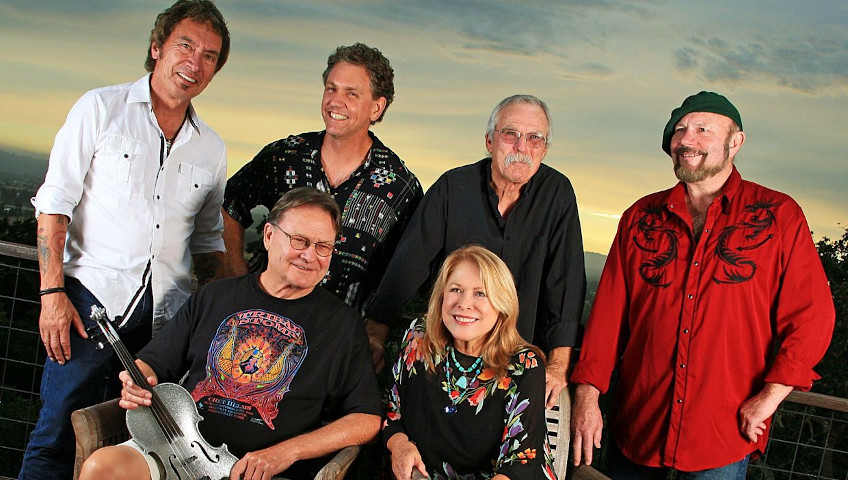
While his musical resumé is lengthy and varied, ranging from symphony orchestras and pop bands to jazz ensembles and improvisational work, David LaFlamme is best known as the violin and lead voice of the legendary San Francisco band It’s a Beautiful Day, whose debut album in 1969 produced the FM radio hits “White Bird” and “Hot Summer Day,” a powerful musical statement that has stood the test of time.
by Peter Thelen, Published 2003-12-01
For three more years and as many albums, the band toured and built a loyal fan base from around the world. But David and the band’s fortunes changed when their original manager Matthew Katz sued for the rights to the band name and all money they had earned using it. The band, without a name, without money, and unable to work, fell apart. Since 1973, David and his second wife Linda have kept the fire burning in several other bands and various incarnations of the David LaFlamme Band. Exposé had a chance to talk with David and Linda one Sunday afternoon in Mill Valley, California, just north of San Francisco. This is their story. Many thanks to Toby Gray for the photos he provided.
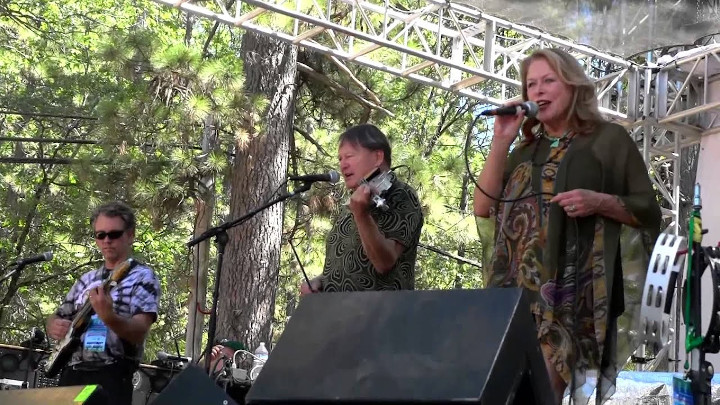 Exposé: How did that July 13th Sunday night benefit show in Reno go? From what you told me in Fairfax, it sounded like it would be quite a production!
Exposé: How did that July 13th Sunday night benefit show in Reno go? From what you told me in Fairfax, it sounded like it would be quite a production!
David: The show went well, it was a difficult show; We played with this band doing traditional New Riders of the Purple Sage type stuff. They started a little late, and by the time we got up there — it was a canopy type stage, the sun had dropped down to about six o’clock on the horizon, and it was just right on us... and now we’re standing in the sun and it’s a hundred degrees, and literally it was so hot that the pegs were popping out of my violin, so it was very much a ‘trying to stay in tune’ problem. Then at the same time we lost our monitor speakers and we couldn’t hear ourselves, so we had to stop the show and the fellow that was doing the sound came up — he was just there by himself, it was a very small sound system... and I guess we maxed it out and blew up something. With technical problems during the show, it made it more difficult to keep it happening, but finally we sort of... you know it’s like getting back on a wild horse, we managed to get on and just ride it to the end of the show, if you know what I mean, but boy we were glad to be through with that.
How long have you been playing with the current band, and how did you connect up with them? The Road Hogs, right?
David: Yes, the Road Hogs. The bass player, Toby Gray, played with Linda and I for about ten years. This is before he started this Road Hogs thing. And then I wasn’t performing for a long time, so he got into other things. Then Linda and I did some shows with Hal [Wagenet] and Mitchell [Holman — early It’s a Beautiful Day guitarist and bassist] and Larry [Blakeshere, played hammered keyboards for IABD in 2000 and 2001 and was murdered in his home in 2001], and various keyboard players, and it was an absolute musical disaster. They had, quite frankly, completely forgotten how to play this music. And that’s essentially what happened when they quit the band in the first place. A lot of the music that Fred Webb and I started writing quite frankly was too difficult for them; they just couldn’t play it.
Linda: Not only that, but they didn’t want to learn anything new, only their material. They didn’t want to do any of David’s material. They just wanted to do “White Bird,” “Hot Summer...” stuff from the first album. And that’s it. No more.
David: So, I took them out, we did a few concerts back east, and I was very unhappy with it, and Linda and I just decided that it was too difficult...
Linda: It cost us concerts that we could be doing right now — that’s how bad it sounded.
Now they played on the “Gathering on the Mountain” shows...
Linda: Yeah, we did one of those with them, then we did the Magnolia Festival in Florida, on the Swaunee River — Steven Foster Park.
David: ...And I had done that concert for a number of years before that. So I plugged them back in, took them out, tried it out... It just didn’t work. Val [Fuentes, drummer] was not happy with Mitchell’s playing at all, because Mitchell plays the bass… improvisationally shall we say? That makes it very difficult for a drummer. There’s just no feel for any pocket anywhere. If the bass is just going here and there and so on, it’s very difficult to sing with, and it’s very difficult to play drums [with]... It was just mass confusion. I’m a real formational kind of guy, very military in my approach, everything has to be in formation... and there will be places that will be more open to free styles, but it has to have a very strong structure.
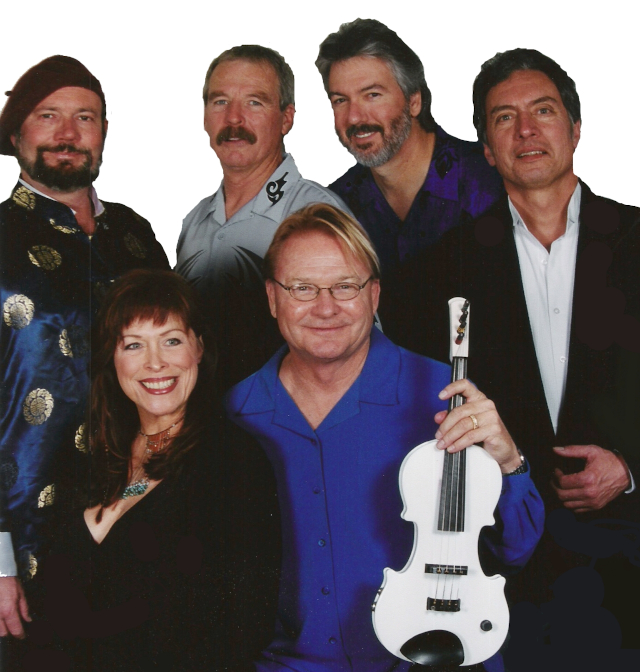 So back to the Road Hogs for a minute...
So back to the Road Hogs for a minute...
Linda: Well, Toby had a band he was working with, which was the Road Hogs. I called him up one day and said “Listen I’ve got this fabulous gig out in Florida and I need a band, so do you think you could put some musicians together?”
David: He’s a very organizational kind of person, very good at organizing. He talked to Rob [Espinosa], the guitarist, and he was very interested; then he talked to Gary [Thomas], the keyboardist — and Gary said “you won’t believe it, but when I started playing, some of the very first songs I learned how to play were some of the early It’s a Beautiful Day songs. Wow, now I get a chance to go out and play these songs... it’s amazing that I learned all those songs years ago!” So Toby called us up and said “Hey, these guys are really into it.” Then I talked to Val several times to see where he was at with the whole thing, because I know Val and Mitchell are close friends — and have been for years and years, so I didn’t know how he would feel about it, that Mitchell and Hal were out. He said “I’m in...” When Mitchell and Hal found out about my plans, of course they got very upset, and this cost us more work... If they found out we were going to play somewhere without them, they would call and harass the club owners and promoters and say “That’s not It’s a Beautiful Day... Hal and I were It’s a Beautiful Day.” In fact in a book that I read Hal was quoted as saying that until he joined the band, it had no direction... We looked at each other and said “That’s surprising. Never heard that before.” First off, we didn’t even have a guitarist in our first year, and then in our second year we had a different guitarist, before Hal. He always thinks of himself as the original guitarist. He isn’t the original guitarist. It was the guitarist from the Fugs [Pete Kearney] that played with us.
Linda: But they [Road Hogs] are wonderful guys. We went up to Santa Cruz, went to the rehearsal, and they already had most of the songs worked out. We just came in there and played them!
David: Toby knew them all because he played with us for ten years, he’s played every song I’ve ever written I think. In the 80s we toured a lot, as the David LaFlamme band. For about six years… I played mostly guitar rather than violin, I wrote a lot of dance music, pop tunes, rock tunes, funk tunes — we were playing big clubs all the time, we needed a lot of short tunes, so I wrote a lot of songs. For a long stretch of time there I played very little It’s a Beautiful Day music. We didn’t need to. And I was bored with it, so it was a perfect chance to just do the David LaFlamme Band thing. We always liked doing a lot of Delaney and Bonnie tunes; we still do. We don’t do any right now, but we always loved doing them, they really work well for Linda and I.
 Okay, let’s hit the past now. David, what sparked your initial interest in music?
Okay, let’s hit the past now. David, what sparked your initial interest in music?
David: I think initially — and I come from a very musical family, it was motion pictures. I loved motion pictures, and I loved the music I heard in motion pictures. Of course I grew up playing all classics, classical symphonies, and classical violin pieces, so I was educated in that way as a musician, but I think soundtracks and movies were a big part of it. The other thing that I’ve always had a fascination for and I loved was songwriting. I loved songs. In two or three minutes you could tell a whole story, and set it to music in one little song, and I always thought that was about the neatest thing in the world.
Did you have any favorite songs in particular?
David: No, not particularly. I loved anything Hoagy Carmichael did, songs like “Stardust,” “Georgia” — to me that’s great music. And the writers in that period were some of my favorites. Most of the songs of that period — late 30s to early 40s that I like, or the 60s. You know I still like The Beatles and Stones and... you know, the ones everyone else likes — and the ones that are still out making all the money! (laughs) It’s Elton and Billy and Mick and Lindsey — you look at the list of top grossing acts and it’s the same people.
Linda: I would say that Django, and Stephane Grapelli... David plays a lot of their music...
David: I have a large collection of jazz violinists: Stuff Smith, Joe Venuti — I met Joe Venuti once — they were very influential. I love the kind of joyousness and playfulness that they brought to the instrument that classical music just didn’t have. Classical music was interesting and beautiful, but it didn’t have the playfulness that Venuti had, or somebody like that. And one of the things that’s real big with me is humor, and music that has a lot of humor to it. I love irony... Irony is important to me. I like music or films that have a lot of irony.
Linda: That’s what’s so great about Dan Hicks’ music.
David: That’s why I got involved with Dan.
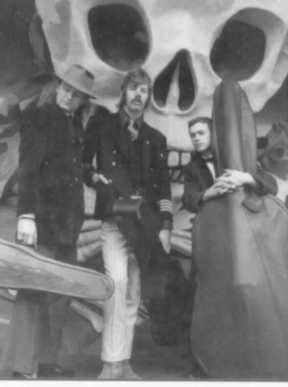 Are you still in touch with him now?
Are you still in touch with him now?
David: Oh, yeah. You know, friendships like that — you could not see each other for years, but the minute you’re together you’re right back where you were when you left off.
I’ve never actually heard the Dan Hicks record that you played on...
David: It’s the one that’s called Early Muses. It’s the one that got him his deal. Nick Reynolds produced it, and it was fun working with Nick, which is somebody that I had been listening to for years and years in the Kingston Trio and so on.
When did you start singing?
David: There were always singers in the house, singing on the radio, like Patti Page, Doris Day, that period... 50s non-rock and roll. I love that music! I didn’t care for a lot of the 50s rock and roll to tell you the truth, it was kind of sophomoric, and I was so glad the 60s came along, because... the whole doo-wop thing... you know, I’m just a middle class kid from a middle class neighborhood. We didn’t know anything about doo-wop (laughs all around), that was big city music. Not that I disliked it, but I didn’t really get excited about songs about cars and... (more laughs) I didn’t care much for the Beach Boys at all, probably like a lot of people, until “Good Vibrations.” I remember my roommate in college went down and spent a summer in Malibu surfing, and caught surf fever. And his room, he’d have the Beach Boys playing. In my room, I would have Dave Brubeck playing... I was very much into Brubeck, Gil Evans, that 50s jazz scene. That was really important to me.
Linda: One of our favorite singers, we found out after we met each other, was Mario Lanza. We both love him. We used to copy him when we were little kids...
David: My grandmother was a pianist and songwriter, and by the time I was one and a half years old, she had taught me about a dozen songs that I sang. I’m very quick to memorize — I’ve always been very quick to memorize, I have a wonderful memory — thank god I’m blessed with that; I just loved to sing those songs. She would play the piano and I would sing.
Linda: It was the same with the violin. If he heard something, then he could play it — without reading it or anything, just automatically.
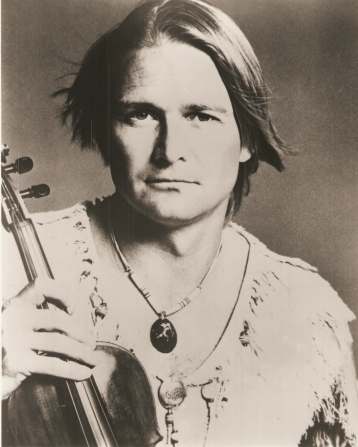 Was the violin your first instrument?
Was the violin your first instrument?
David: Yeah, the violin was my first instrument. But then my violin teacher also required that you study piano along with violin. Every Saturday I had my piano lesson and my violin lesson.
Why violin and not guitar or something else?
David: Well, you know, looking back on it now, it was probably just fate. I probably would have become a guitarist rather than a violinist, but what happened was — and this is how many children end up playing a particular instrument — it’s the only one they have. In other words, their brother played the clarinet for a few weeks, and they still have the clarinet, and so that’s what you’re going to play. I loved the sound of strings. I thought it was the most beautiful sound. I didn’t realize that it was a lot of strings. I would ask, “What is that sound? I love that sound!” and my mother would say “That’s the violin,” and of course that’s what I thought I was going to sound like! But of course when a big violin section comes in, if I could sound like that, versus the oboe — that’s for me! (laughs) And essentially that’s kind of the way it’s worked out when you figure the amplified electric violin... it is big, there’s a lot of sound to it. But I had an aunt who lived in Connecticut — where I was born — she had a daughter that had played violin like when she was five or six years old for a very short time, like a lot of kids do, and then it sat in the closet for the next twenty years. So when she was doing some housecleaning, she stumbled upon that little violin. And she said that the minute she took it out, she thought of me; she thought “that kid loves music.” So she put it in a box and sent it off to me, and I got it one day in the mail. And there was a lady that taught piano — not my teacher, but she lived just down the street, so my parents gave it to her to tune it, she knew something about violins, and I immediately started playing on it.
Did you play any other instruments over the years... maybe mandolin or others in the violin family?
David: Oh, I have a mandolin and a viola... in fact the instrument that I’ve been playing electric all these years for the most part is actually a viola. It’s a little viola with a high E violin string on it, it’s really not a violin. And I prefer the viola sound because it’s a little deeper, a little lower, a little richer. Violins can get kind of screechy, whereas the viola has a little more mellow tone to it.
Linda: He playes piano incredibly, he went to study for a while, and he got to a point where he’s really starting to move up there in his playing.
David: Well I can play any kind of what we call light classical or popular music. The frustrating thing about me and piano is that what I always wanted to do is play jazz piano. It’s the hardest darn thing in the world, you just have to be born with a talent to do it. I tried and tried and tried to become a jazz pianist, and I just can’t do it. It’s frustrating as heck, because I’ve always been able to do whatever I decided to do. But when it comes to being Bill Evans on the piano, I can’t do it and it really ticks me off! (laughs all around) I can play sort of a jazzy pop version of “Misty” and things... jazzy, but not like improvisational.
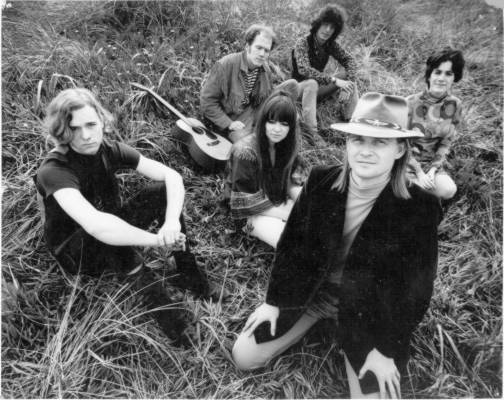 You played violin with orchestras and such as you were growing up in Salt Lake, but how did you end up in San Francisco? What brought you here?
You played violin with orchestras and such as you were growing up in Salt Lake, but how did you end up in San Francisco? What brought you here?
David: I was in the service and stationed at Fort Ord [ed: near Monterey] and while I was in the service I lost some hearing — with all the guns and everything. In fact I still am a little bit hard of hearing even to this day. They didn’t give you any ear protection in those days; I fired all kinds of weapons — big weapons, and it blew my hearing out. And so they put me in Letterman Hospital, and discharged me from the army. And there I was, in San Francisco... and I’d been bangin’ around town on leave a lot, and I’d really fallen in love with the city. I thought it was the most fantastic place in the world, everything about it. So when it came time to decide what I was going to do, I had my duffel bag — mostly just Army clothes, and a few bucks in my pocket — and I just walked off into the city and started my life.
I got very, very lucky. The first or second night that I was in San Francisco, I went into the Condor Club, there was a band playing there that called themselves The Righteous Brothers, and lo and behold, who comes walking in but a girl that I used to date in college, Liz; a great girl. “David, what are you doing here!?” “Well, I’m just here now.” “Where are you living?” “Over there, on the street.” “You can come and stay with me,” she said, “for a few days anyway. But the thing is” she said. “I have a roommate, and we’ll just have to see how it goes with you living with me.” Well, to make a long story short, her room mate was named Linda. Now this is the hard part of this story: There came the day when Linda and I had to tell Liz that she had to move. (laughs) And what, I suppose two years later, she and I were married, my first wife Linda.
So that was how Linda and I got started together. By the second day that I was there, she and I had already written a song together. We started writing songs almost immediately, in fact within the first month that we knew each other we went into Gold’s recording studio and recorded — just piano and voice. We cut a couple of sides — original songs we wrote, and I remember Mr. Gold, who owned the studio, he just loved the songs, loved my singing, and he actually started promoting it to people that he knew, and very soon I found myself singing [in a band]. The bass player had been with Brubeck for many years, and the drummer and the pianist were the highest professional caliber. I cut four sides with them, and I sent those songs off to this record company and got my first record contract. I still have it at home. I never signed it. That would have been around ’63. I showed it to a lawyer friend of mine and he said, “You can do better than that. Just wait. Keep doing what you’re doing, don’t sign this one, get a better one.”
Was it folk music or jazz or...
David: Well, they were sort of jazzy pop tunes. Remember Barbara Lewis? (David sings a bar of “Hello Stranger”) They were kind of like that. And then I also cut some tunes that were just demos of cover tunes that I did, for my so-called night club act. And then I appeared at the Hungry I, on TV, and some stuff I did around town.
It seems like there was no downtime...
David: No, there was no downtime. I started working on making a career of music the minute I got to San Francisco. And everywhere I would go it was happening. I used to hang out in North Beach where I met Garcia and Dino Valente and Fred Neil and Billy Roberts and a lot of people. [Billy Roberts wrote "Get Together" for the Youngbloods] We became friends, and I studied guitar. I bought myself a Martin guitar and really worked hard at learning how to play folk guitar so that I could accompany myself at these hootenannies. So I started going around town with my songs and my guitar, this is without Linda of course, and I was just sort of testing the waters to see if I was the next Bob Dylan, or if I was just sort of a half-assed singer songwriter — which is pretty much the conclusion I came to. (laughs all around) I was never going to be a great folk writer or singer or anything like that, so even as hard as I tried... I wasn’t terrible or anything, I had talent, I just wasn’t bright enough or experienced enough to be the next Bob Dylan. So that’s when I decided I would try something else, like playing my violin more again.
So I was playing with this band, doing mostly early Stones, cover tunes, and so on... I was playing rhythm guitar and singing. We were playing around San Francisco and the Bay Area, playing for dances. Well, one day I decided that I would bring my violin to rehearsal, and play it on one of the songs in the show. I remember it was a Lovin’ Spoonful song. I did a little arrangement for the violin. When we did that number during the show that night, the audience just went nuts. So when we got back to rehearsal, the guys in the band said, “We’ve gotta do more of that.” Pretty soon I wasn’t even playing the guitar anymore, I was just playing violin. So that got me back into the violin thing again, and shortly after that I met Bobby Beausoleil and he and I decided to put this Orkustra group together.
 The Electric Chamber Orkustra. How did that group come to be?
The Electric Chamber Orkustra. How did that group come to be?
David: The way we did that — we had this old plumber’s shed right around the corner from the Straight Theater, corrugated steel, asphalt floor, and we would put signs up all around, like Ironed Out Coffee House, the Donut Shop, all the different places, advertising for our jam sessions — open to anyone who could come, bring whatever instrument you want, and we literally were going to have these big, free-form jam sessions. And a lot of different musicians came to those sessions and sat in. Maybe they came once, maybe they came twice, some kept coming. Jesse Barrish for instance, he co-wrote a lot of songs with Marty Balin, he was an early member — he played the flute, and he was with the Orkustra for quite a long time. We played a lot of benefits for the Diggers [editor’s note: Diggers were a late-60s San Francisco anarchist street theater troupe], and Kevin — who was the head of the Diggers was a good friend of mine and so we did a lot of Diggers shows, we played in the park and the panhandle practically every Saturday. And again, we would just invite people to come and play with us.
Was it structured at all, or did it evolve into that?
David: Well, it was structured in the sense that we would start out, and I would establish a tempo, and then I would give a musical line — a melody or a bass part, shall we say, and from there on it was all just free-form. When we would run out of gas on that, I would give the band another tempo, another drum beat, another bass part, and another line to play off of... every song was just built like that. Hence, you could hear a song like, for instance, early “Time Is.” I’m giving somebody a tempo, it’s from a Samuel Barber piano excercize I remembered from when I was a kid, so I gave him that bass part (David sings the bass part from “Time Is”), then the drummer — okay, you play backbeat to that. Then I’d give the other guy... I’d say “Henry, this is your part” and (David sings another part), and then I’d give myself a part (sings the melody from “Time Is”). So... on the spot. And that’s how we made every song, just made them up. Usually they would come from memory, from pieces I had played, or excercizes, or something.
What was Bobby’s part in the Orkustra?
David: Well, he played a little bit of guitar, and he played pretty well. But mostly he played electric bouzouki — you know what a bouzouki is? He had a pickup on it, and essentially we were trying to do what we used to call raga rock, that was the form we were trying to do, and the group just narrowed down to its form, which was Bobby, Henry, Jaime, Terry, and David. The drum beats we used were kind of an offbeat Middle Eastern sort of thing. Raga rock with a Middle Eastern sound, that was our thing, and people loved it. It was very different from anything around, nobody was playing this Middle Eastern raga rock with with oboe, violin, bouzouki, bass, and drums. It was a unique sound and we got a lot of work.
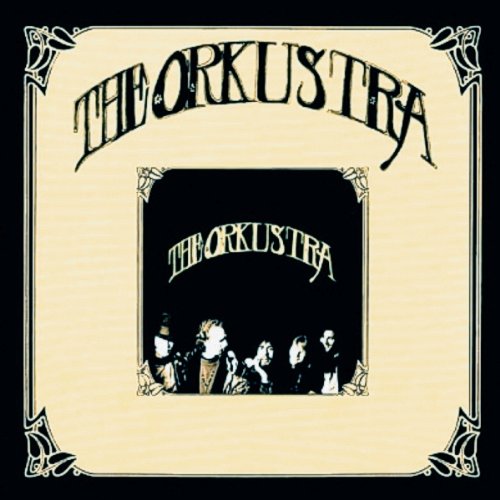 Did you record?
Did you record?
David: You know, we never did get around to doing much recording. And unfortunately the San Francisco narcotics squad ended our reign of terror, when we got busted... that was the end of the Orkustra. And on that note, I ran into Bobby Beausoleil one day and I hadn’t seen him in months; I ran into him in the Haight-Ashbury right around the corner from the Grateful Dead’s place, right across from the Donut Shop. He introduced me to his new friend Charlie Manson. That’s the only time I ever met the man. Bobby said he was going off to Los Angeles with this fella, and he had a box of all his possessions — a cardboard box. He wanted me to keep that box for him until he got back. Well, last year I returned that box to him... he had no idea that I still had that box with all his stuff in it. That blew him away. He couldn’t believe it — in there were a lot of recordings, Orkustra recordings, recordings that he made with Charlie, recordings that he made for Kenneth Anger for the movie Lucifer Rising... I had saved all those recordings for all of those years. And very soon, there is going to be for the first time ever, an Orkustra album. Bobby has taken all those tapes and worked on them and worked on them, all together from his prison cell, with help from the outside... friends, and he’s turned the whole thing into an album — an Orkustra album! I couldn’t believe it! All from those tapes I gave him. I never thought about doing that, I didn’t realize there was enough in those tapes to even make an album. So there it is.
Somewhere around this time you co-founded Dan Hicks and his Hot Licks. How did that formation come about?
David: I had met him while I was playing with the Orkustra, we played in a couple of shows together; I met Dan and all the Charlatan guys. Dan called me from his houseboat in Sausalito. I went over there, it was sitting on its side, in the mud... (laughs) For our first rehearsal, it was just the two of us. He started playing some of these songs for me, I just got the biggest kick out of them — I thought they were absolutely hysterical. Very joyful, very playful, very funny, very ironic — all the things I like! I became instantly infected by his music. So we had a few rehearsals and he said to me, “Do you know a good stand-up bass player? What about that fellow that’s playing with you in that Orkustra group? Do you think he’d be interested in playing with me also?” So Jaime [Leopold] came and sat in, so now there was the three of us. That was a lot of fun, because here was somebody I had been playing with the last few years, and he and I were going to continue on together.
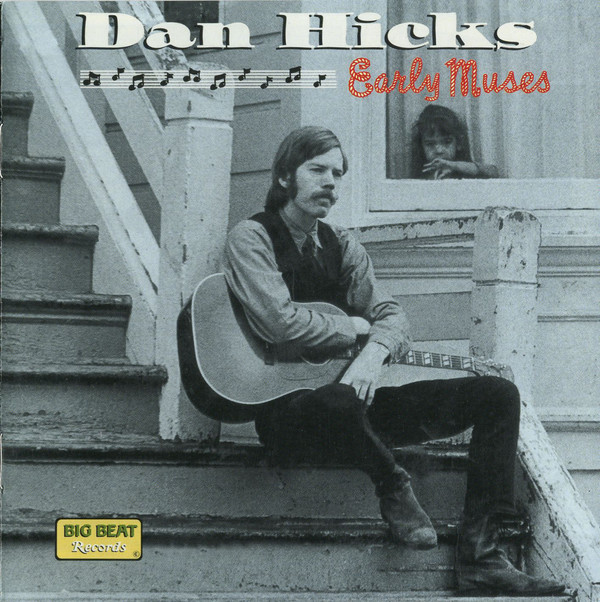 How long did you stay with him? By the first album you were gone.
How long did you stay with him? By the first album you were gone.
David: I guess close to two years. We did a lot of playing around, and we did the album that is now called Early Muses, for Trident Records. And at the same time I was trying to get this Beautiful Day thing off the ground, and Linda’s and my music, which was really important to her certainly. And it got to be where I couldn’t do both anymore. There just wasn’t time. I think the last show I did with Dan — I played with him at the Fillmore, and It’s a Beautiful day at the Avalon, at the same time, and I got Bill and Chet to stagger the sets in such a way so I could go back and forth from the Avalon to the Fillmore so that I could play with both groups. It was a wonderful time, but I realized at that point that I was going to have to make a choice. As much as I hated to leave Dan, the choice was obvious.
So with It’s a Beautiful Day, did Katz put the band together, or was there already something going when he stepped in?
David: He had been trying to put this concept group It’s a Beautiful Day together and it just wasn’t... I guess I was the first one who showed up who had any organizational skills. I remember Joey Covington and Pattie Santos were both in an earlier version of It’s a Beautiful Day. And [later] when we went to court over the name and so on, the reason he prevailed in that court case, is because there was an earlier version — in other words I was not in the original It’s a Beautiful Day group. People don’t understand that but there was a group of people before me, it didn’t stay together — it fell apart. He wanted me to use Pattie, and Joey on drums, and he wanted me to sing with Pattie — I liked Pattie, but I didn’t care for Joey’s drumming at all, so I told him, “You’ll have to let me choose my own rhythm section.” It’s not that he was bad, his style just didn’t work in my music. So I sent him packing and Matthew said “Okay, choose whoever you want.” So I did, I chose Val and Mitchell.
My understanding is that for about a year or so you were San Francisco’s best kept secret. You rehearsed regularly and wanted to play out, but Katz wouldn’t allow you to play any gigs. Tell us about that...
David: No. The big problem was — one, getting any money out of the man — it was next to impossible, and then he didn’t want us to play. Remember reading how Moby Grape released six singles at the same time? They still talk about that... It was just the stupidest idea, but he got the label to do it. I think he had in mind for us twelve singles at the same time, but up until that point, no one would be allowed to hear us, or see us. And I kept thinking, “That’s the dumbest idea I’ve ever heard,” and besides that, how were we supposed to live?
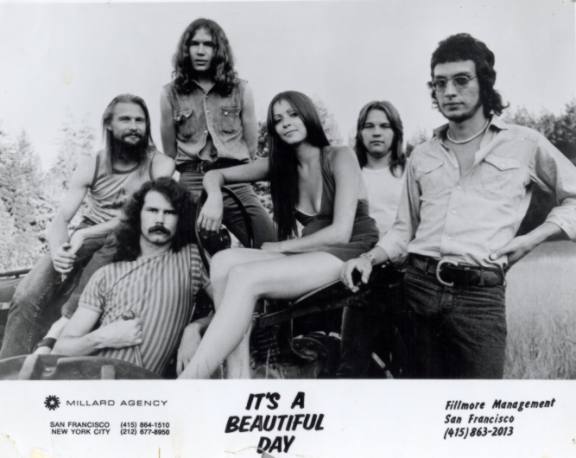 How do you build up a following? You have to play out.
How do you build up a following? You have to play out.
David: He absolutely forbid us to play out. But I had people begging me to come and play, at that club that Marty [Balin] had down in the Fillmore — the Matrix, I could have played there any time I wanted. And then I had my whole Orkustra and Dan Hicks reputation, so I already had sort of a reputation. So we went down and played against his orders, at the Matrix Club. Right after we finished playing the first night, he and some of his “friends” came down there and took all our equipment. Everything. Every amp, drums, everything. Just wiped us out. He said “Okay, if you’re not going to listen to me, you can’t play if you don’t have any equipment to play.” So we had to start all over. We finished playing that week because the Jefferson Airplane loaned us their equipment to play with — amps and drums and keyboard and everything — and we ended up playing the whole weekend. It was the first money we had made in a long long time. Linda was pregnant, we had no money. We had a one bedroom apartment; Linda and I slept in the living room, and Val and Mitchell slept in our bedroom, and that’s how we lived. Four of us in a one bedroom apartment. And... he didn’t want us to play. Anywhere.
But he didn’t pay you anything for not playing either...
David: Well, he gave us grocery money. But it didn’t pay rent or other expenses, it was just a little bit of grocery money all the time and that’s it. He was crazy then and he’s crazy now. His ideas are crazy. The reason that he has failed with all these different groups and ended up in court is because he’s a bad businessman. I couldn’t understand it to save me. I racked my brain and I kept thinking about what he wanted and his concept, and how he was going to launch us into the world. And I just thought it was the dumbest thing I’d ever heard. And that’s what I had to deal with there, so you can imagine – but what was I going to do? I put all this time and investment into this It’s a Beautiful Day thing, and he doesn’t want us to play anywhere.
So after he took your equipment, you bought new equipment and told him to stuff it?
David: That was it. Goodbye. Of course we paid the price later on when he sued us and destroyed us again and took all our equipment again.
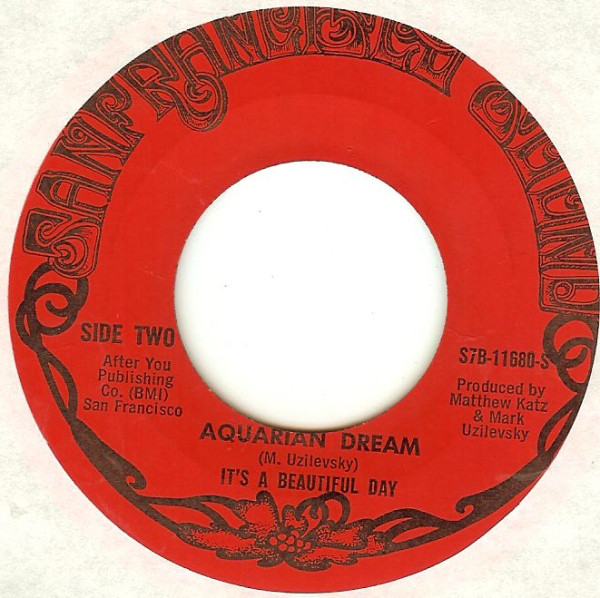 There’s was a single “Bulgaria” / “Aquarian Dream” released on his label around that time; I’ve never heard it. Is that the same version that was on the LP? And what’s the deal on that B-side?
There’s was a single “Bulgaria” / “Aquarian Dream” released on his label around that time; I’ve never heard it. Is that the same version that was on the LP? And what’s the deal on that B-side?
David: No, It’s mis-labeled. He didn’t know what it was called. And then there’s another recording that he claims to be It’s a Beautiful Day, however it isn’t. I don’t know who those musicians are, but it’s not us. You see, in his mind it doesn’t matter who the musicians are. You have to understand, It’s a Beautiful Day is his group, he conceived it, and therefore whoever he designates — in his mind, to be in it, that’s his business. [Like] Don Kirshner with the Monkees... Don Kirshner was his idol. It’s his concept, he makes all the decisions. Well, that’s one thing if you’re really good at making good decisions, but what if your decisions are poorly made and not well thought out? And you disregard everyone else? Well... people can’t work with that for any length of time. A bad businessman making stupid decisions. He’s just another one of these stupid people who doesn’t know what he’s doing.
How much other material was recorded in the early days of the band that never made it to the first album?
David: Nothing, really. There might be one or two pieces somewhere that I have that didn’t make it, but I’m not even sure of that. Most of those pieces, other than “White Bird,” are pieces that I wrote — a lot of them — from the Orkustra period, that grew into what I incorporated into It’s a Beautiful Day.
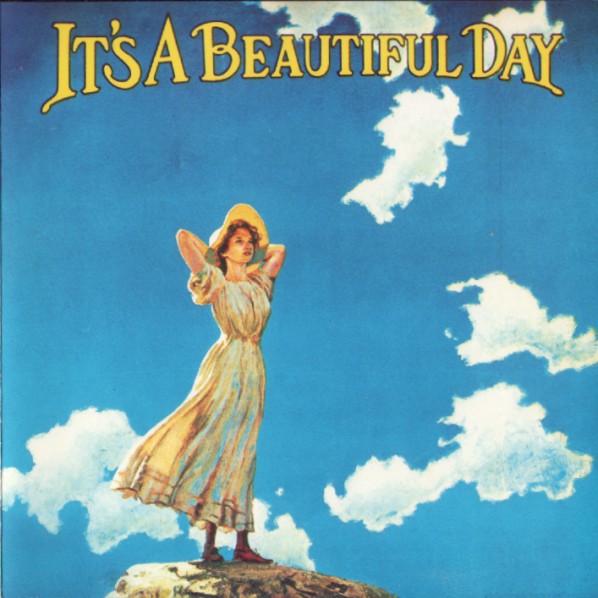 One of the most memorable and timeless tunes on that first album was the instrumental “Bombay Calling.” Who is Vince Wallace, and how did that collaboration come about?
One of the most memorable and timeless tunes on that first album was the instrumental “Bombay Calling.” Who is Vince Wallace, and how did that collaboration come about?
David: Well, Vince Wallace was a saxophone player that used to come over and jam at our house — we had a band house up in Twin Peaks area. Jaime and I had a house up there, with a piano. We used to invite people up and they would come by and jam. Vince came up one day and jammed with us, and started playing that little tune (David sings the main theme from “Bombay Calling”), so essentially we started jamming on that, and then I wrote some other sections for it. It was his melody, and then I wrote the rest of it and called it a collaboration. Later on he was angry with me, he said, “You stole my tune.” I said, “Well, sort of.” And I talked to Jaime about it recently and Jaime thought it was a collaborative effort, but Vince doesn’t see it that way. He goes around to people telling them that I stole the song, but that’s not true.
Well Deep Purple did steal the song...
David: Oh, they stole it flat out. The keyboard player for Deep Purple spoke about that in an article recently. In the article — I have it at home — they ask him about “Child in Time” and he said, “Well, we did this show with this group called It’s a Beautiful Day back when,” and he said, “They played this song they called 'Bombay Calling,' and it just knocked me out, so I went home and started fooling around with it, and that’s how I came up with 'Child in Time.' ”
Well... at least he’s honest!
David: Yeah (laughs), he’s honest.... (more laughs)
That’s one of their most popular songs.
David: It is! And you know, people have been asking me that question ever since I can remember: “Gee, there’s a Deep Purple song that sounds a lot like Bombay Calling.' ” “Oh, I know, believe me I know,” I say, “It sounds just like it...”
I know they ripped off “Don and Dewey” too, and made a song called “Wring That Neck,” but they even managed to release that before you did. I looked at some setlists from ’68 and you guys were playing “Don and Dewey” way back then.
David: Yeah, we were playing that song way back in 1968. See, that’s another. Oh, I was amazed when they came out with some of those tunes... (laughs) They either had very good memories or a tape machine, and they’ve been taping our sets or something and using our music to work up their new album. It would be interesting if we got a gig with them someday — I’d love to be co-billed with them. I’ll announce “now here’s the original version of Child in Time.” (laughs)
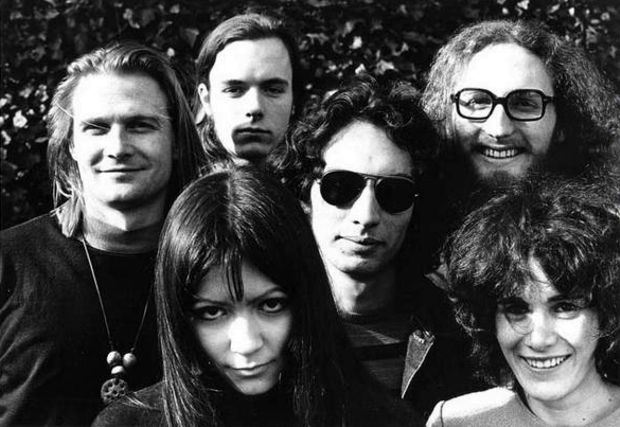 The first of many lineup changes came around the time of the first record, with the departure of your ex-wife Linda on keyboards. Why did she leave at that point?
The first of many lineup changes came around the time of the first record, with the departure of your ex-wife Linda on keyboards. Why did she leave at that point?
David: Linda had no desire whatsoever to go on the road, and to this day has never flown on an airplane. Absolutely terrified of flying. She doesn’t like any kind of public transportation, trains, planes... So it was, how are we going to keep going if we cant go on tour? You can’t go on tour everywhere in a bus or a car; you have to fly. So that’s what really decided that — she just wanted to play around town and that was it. I wanted us to get out there and play the world.
So after that Fred [Webb] was in.
David: Right. And Fred was a very very good stabilizing [force within the band]. He was very musically educated with a lot of good ideas, and his ideas weren’t so far from where I wanted to go and the rest of us wanted to go. The music was a little more cheerful than the first album, because Linda has a very blues-oriented type of thinking in her music. I never wanted to record it but she wrote a song called “Food Stamp Blues.” That was kind of the way Linda is, she lives over in a very integrated area of Oakland and teaches piano, and she’s very happy with that.
I read that she was later in a band called Titus’ Mother, but I can’t find much information about them.
David: Yeah, she started her own band Titus’ Mother, did “Food Stamp Blues” and a lot of other — what I call protest music. Very political. I remember once, Freddy over at Keystone [a club in Berkeley] he had spoken with Titus’ Mother and they wanted to play there, and he said, “Do you think you could get that ex-husband of yours to play?” So I talked to Freddy and he said, “I want you to play here at the Keystone, but I want your ex-wife to be on the bill as the opening act.” I said “Freddy, this is going to be the biggest mistake that you ever made in your life, you’re going to be so sorry you did this.” He said, “No, I’m not, no I’m not, I think it’s going to be fantastic. The place will be packed.” I said “Oh, there will be people there, but you’ll be sorry.” Guess what? She got her friends, they made some signs, and they paraded up and down in front of the club all week before we were supposed to play there because of the high ticket prices. (laughs) He called me and said “What is she doing? David, please, I don’t understand.” (laughs) “I told you Freddy, she’s vey political and she doesn’t like these fifteen dollar ticket prices, she’s really upset about it.”
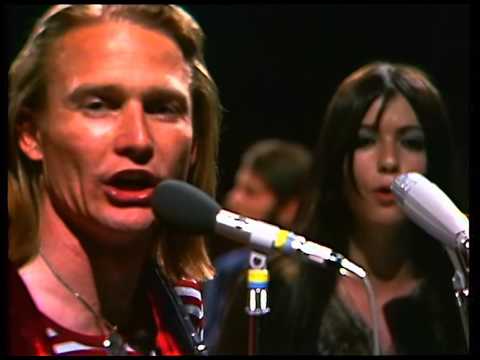 Wasn’t there an incident where someone in the band was hit in the head by a bottle thrown from the audience? I seem to recall hearing something about that at the time.
Wasn’t there an incident where someone in the band was hit in the head by a bottle thrown from the audience? I seem to recall hearing something about that at the time.
David: Yeah, I’ve been hit a few times, but I was actually attacked on stage by a fella, down in Atlanta, Georgia. You know they had security all over the place, but it’s funny, this guy just comes wandering out on stage, and I turn around and he punches me right in the face while Im playing. I just sort of fell back on my butt on the stage and I’m spinning spinning spinning... and all I could hear was people screaming, and I look out in the audience and all these horrific faces out there. I finally staggered up to my feet, and I looked around... the band has now gone — I don’t know where they are, they all ran away... So what could I do? I jumped to my feet and started playing “Hoedown,” pretending like it was part of the act. And the other guys gradually all came back on stage, and we finished the show. The guy was high on something. Why he chose to do that? Just to get attention I think. Fortunately he didn’t do any major damage. If he’d hit me in the eye or something, that would have hurt.
The first album seemed like the product of a very refined singular vision, whereas the second, Marrying Maiden, is more festive and fun, and branches out into a number of different directions... What are your thoughts about that album looking back from 35 years after it was made?
David: There was a different feeling. It had changed a lot. The whole music scene started changing, and a lot of the groups we were playing with — Quicksilver and others, a lot of their music was less personal and more upbeat and outgoing. It was a very solemn period of music on that first album, I was ready to do some music that was more festive. And then we were doing a lot of outdoor festivals; well, the music from the first album — a lot of it didn’t work so well in an outdoor festival setting. It was too solemn, too bluesy, and too inwardly focused. If I would have kept going that way I would have ended up like Jim Morrison, getting more and more into that personal torture trip, and I didn’t want to keep going that way.
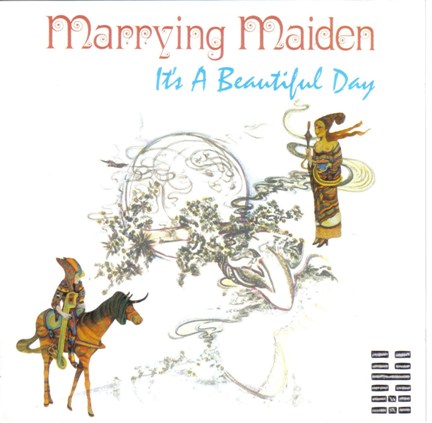 Almost everyone in the band wrote songs on the second album...
Almost everyone in the band wrote songs on the second album...
David: Yeah, I wanted to give everybody a chance to express themselves and make music that they would enjoy playing together. It just makes more fun out of it. I think it was successful in that sense. We could do a lot of different kinds of music, so why be so limited to just the “White Bird” thing.
You did a little of that too, like “Do You Remember the Sun” could have come right off the first album...
David: Absolutely. And that’s why Fred was so important, because he understood that. And when I left the band, just to skip forward to that point for a moment, you wonder why a guy would just walk away from his own band. To me the rest of them just lost sight of what got us there, and what kind of music It’s a Beautiful Day should sound like. I was so far afield from where they were that when they did that Today album — which was my concept, the whole “It’s a Beautiful Day Today” thing, I had written some stuff that was... shall we say reggae-oriented music, with that kind of feel. It wasn’t too long after that Paul Simon came out with “Mother and Child Reunion” and I thought “That’s it, that’s where I wanted to go,” and when I played those songs for them that I’d written, they hated them, and said, “We do not want to play that kind of music, we want to play more straight-ahead harder stuff.” And I said, “I don’t want to do that. You guys go ahead, you go and do it.” They wanted to get more metallic. It’s not good for violin, I don’t really want to sing that kind of music.
Jerry Garcia contributed pedal steel to “It Comes Right down to You,” and banjo to your bluegrass stomper “Hoedown.” Tell us about how he came to play on these two tunes.
David: I’d known him for years and we’d done a lot of shows together, and I thought, “You know, I love Jerry, so I think I’ll ask him to come down and play on my record,” and I asked Richard Olsen [of the Charlatans] to come down and play clarinet; I thought I’d just ask friends, people I know and like, have them come by and do a little pickin’ on this and that. Why not? I could afford it. I thought there was a couple things that Jerry could do. I knew he could play banjo and I knew he could play pedal steel — of course I’d jammed with him.
Did you guys ever play “Hoedown” live?
David: No, we never did. He never played live with us. And I don’t bring it up very much because there’s so many of these Jerry Garcia hanging-on type of people, they played at a jam session with him once and now they’re promoting themselves as though they were in a band with him or something. They’re everywhere.
What about these songs? J.W.’s IABD set list database on the internet refers to a number of other tunes that haven’t appeared on records: “Is Your Love Real,” “Countryside,” “Who Can Know,” “20-20 Vision.” Were those originals, and were any of these ever properly recorded in a studio?
David: Yeah, you’re right, they are songs that... Maybe I have recordings of those songs. Yeah, I have recordings of them. I never put them on an album or anything. They’re not really that good. I wasn’t all that happy with the recordings. Tried them out live and they didn’t work, so I just dropped them.
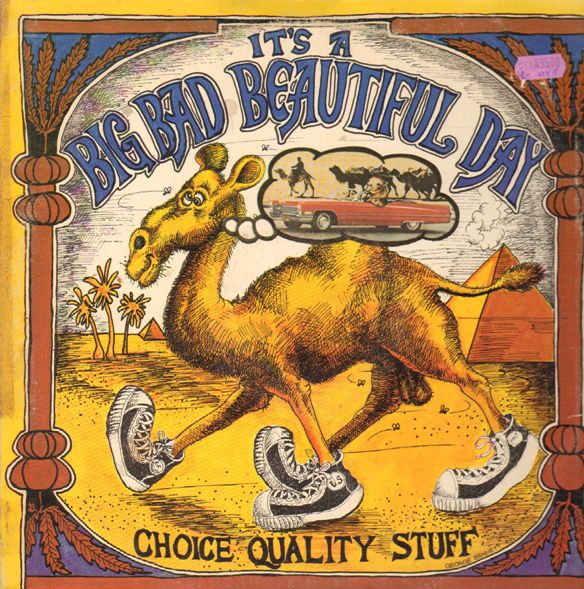 Over the course of the third album, Choice Quality Stuff / Anytime, two more members, Hal and Mitchell, left the band,and were replaced by Bill Gregory and future Zappa bassist Tom Fowler respectively. Why was the turnover rate so high during this period?
Over the course of the third album, Choice Quality Stuff / Anytime, two more members, Hal and Mitchell, left the band,and were replaced by Bill Gregory and future Zappa bassist Tom Fowler respectively. Why was the turnover rate so high during this period?
David: Well, that was Mitchell and Hal’s choice. They left in the middle — they gave me certain ultimatums, that if I didn’t play some songs that they wanted to play, that they would quit. I said, “I’m sorry, but that is the way it is. This is a dictatorship. I choose what songs go on the record.” They didn’t like that. I said, “Just look at it this way: you want me to record this song of yours. How many songs have you written?” and he said, “Three,” and I said, “I’ve written three thousand songs, and I’m not choosing one of those.” “And second,” I said to Mitchell, “Your songs all begin with the word “I” — did you ever notice that? You know that doesn’t work for a group.” That’s for Neil Diamond – let him do all the “I” songs.
What are your thoughts looking back on the third album?
David: Some of it is very good, there’s a lot of tunes that... In fact this rehearsal I’m going to work up one song written by Fred Webb — it’s called “Ain’t That Lovin’ You” — and “Misery Loves Company” from the third album, a tune that my friend Rod Taylor and I put together. I’m trying to pick up a couple things off each album and work them up again, and put them with some other new pieces of mine.
What happened on Carnegie Hall? It seems like everything is sped up and the band is in a hurry to finish the set.
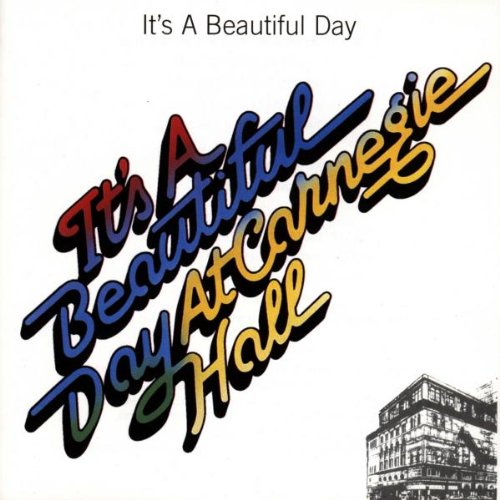 David: Well, Carnegie Hall is like this: I produced a different Carnegie Hall album, you haven’t heard that one. No one else has either. In 1993 when Sony wanted to put out a greatest hits [set], I got a call from the guy that was going to produce it with me and he said, “I’ve been in the vaults, going through this, looking at all the boxes of tape — I didn’t know there were two Carnegie Hall albums.” He said, “I got the other one out that I’d never heard, yours, the one you produced, and I played it, and I loved it. Then I played the other one, and I didn’t really care that much for that one [the version of Carnegie Hall that was released], why didn’t they put out David’s Carnegie Hall?”
David: Well, Carnegie Hall is like this: I produced a different Carnegie Hall album, you haven’t heard that one. No one else has either. In 1993 when Sony wanted to put out a greatest hits [set], I got a call from the guy that was going to produce it with me and he said, “I’ve been in the vaults, going through this, looking at all the boxes of tape — I didn’t know there were two Carnegie Hall albums.” He said, “I got the other one out that I’d never heard, yours, the one you produced, and I played it, and I loved it. Then I played the other one, and I didn’t really care that much for that one [the version of Carnegie Hall that was released], why didn’t they put out David’s Carnegie Hall?”
Is it the same performance?
David: No, it’s different performances, and different songs. You see, I left the group right after Carnegie Hall [the performances], so what they did was they got another producer, and Pattie and Bud [Cockrell, bass / vocals] and them, they chose those songs. I had nothing to do with the production of the one that came out. My Carnegie Hall album is way different and way better. Different performances, different songs, you wouldn’t even believe it. I never would have put that out. It’s been an embarassment to me ever since. You know, someday maybe the one that I produced will see the light of day, though it’s doubtful with the whole Matthew thing and all, but there it is, in a box, and it’s quite a lovely album, and it’s a lot more like the bootleg. I have those tapes too, I have the KSAN tapes, all of the ’71 stuff that you heard, Creed of Love. That’s where that’s from.
Those are excellent.
David: Yes they are. And so I decided to put that together, and put it out, and sell it to a European label. Now that’s something that I was proud of. I thought those performances were strong, really good sounding. I wanted people to hear something besides that Carnegie Hall [release].
There was about five years between the time you left It’s a Beautiful Day and your first solo album, White Bird. What were you busy with during that time period? I seem to remember reading something about a band you were playing with up in the Russian River area. Did you record with them?
David: I had a band called Love Gun, another band called Edge City. I wrote music for those bands. Edge City was kind of a funky country bluesy band. One of the songs I wrote for that band is called “Pick up Sticks.” That’s one I wrote for the Edge City repertoire. And then after that I wrote another bunch of songs that were more rock-romantic tunes for my band called Love Gun. That was the first band Linda was in, where she was singing with me. I never made a record with Love Gun, in fact I never recorded those songs. Someday maybe I will, but they sound kind of dated now, they were good at the moment. More rock oriented. So I haven’t picked any of those up. Then there was another band I had called Clouds — that was a fusion band. The piece on the new CD, “Swept Away,” I wrote that for Clouds. So that’s where that came from, and not a lot of people know that. I did do that on that first Amherst album White Bird; the reason I recorded that one again is because these new guys I’m playing with, they just love that piece, they love playing it, they can’t wait to play it every time, it’s like their favorite. And not that many people have heard my first solo album.
 That was a really difficult period to go through. The guy that owned that record company was a liar. Right in the middle of that first solo album he threw a giant monkey wrench right into the works. In my agreement with him, when I made that album, was that he would give me complete artistic freedom. No sooner did I get started — I’d made three or four recordings for the album, and he came in, he listened to it and said, “No, no, I’m not paying for that.” I said, “What are you talking about? What do you mean?” He said, “No no, not that music, I’m not paying for it, I don’t like it.” I said, “Well, this is a great time to tell me — I just spent sixty grand! What do you like?” He says “I like that first album of yours, I want you to make me another one like that.” I said, “What do you mean like it?” He said, “Just like it. I want you to just copy those songs, just like on that album. Make those songs on my label.” And he said, “I’m not giving you another dime until you start doing that.” So, you can imagine. The wind just went out of my sail.
That was a really difficult period to go through. The guy that owned that record company was a liar. Right in the middle of that first solo album he threw a giant monkey wrench right into the works. In my agreement with him, when I made that album, was that he would give me complete artistic freedom. No sooner did I get started — I’d made three or four recordings for the album, and he came in, he listened to it and said, “No, no, I’m not paying for that.” I said, “What are you talking about? What do you mean?” He said, “No no, not that music, I’m not paying for it, I don’t like it.” I said, “Well, this is a great time to tell me — I just spent sixty grand! What do you like?” He says “I like that first album of yours, I want you to make me another one like that.” I said, “What do you mean like it?” He said, “Just like it. I want you to just copy those songs, just like on that album. Make those songs on my label.” And he said, “I’m not giving you another dime until you start doing that.” So, you can imagine. The wind just went out of my sail.
How did you get through that impasse? You have “White Bird” and “Hot Summer Day” on there, but the rest is new material.
David: Well, I decided I would record “White Bird” again, because he wouldn’t give me any more money, then once I made the “White Bird” recording, he said, “Okay, that’s better, now you can do what you want.” Then he lied again, and he wanted me to do another one of the old songs, so that’s when I did “Hot Summer Day” What can I do? At the time I chose to do that album, he was kind of a monetary angel. I was very broke, very behind in my child support payments, and I was just really in bad shape financially, everybody was angry with me. My kids were angry with me, Linda was angry with me, everybody was angry with me. And I mean that’s all I could do; keep focused, keep pushing ahead, get through this all the best I can, and save a lot of what I thought was my better stuff for the next album. So a lot of the songs you hear on the Inside Out album, I already had those, but I didn’t let anybody know it. So I threw in “This Man” and “Swept Away” and a bunch of stuff I just had lying around, odds and ends, garage sale. And I kept the other stuff that I wanted to do, “Day You Went Away” and the other songs, for the second album, when I knew I could get some artistic freedom. He gave it to me on the second album, but when I finished making the album he pulled the plug on the whole company.
When he pulled the plug, you were out on tour, right?
David: Out in the middle of a tour, touring around with Billy Joel. My manager called me from L.A. and said, “You better sit down, David, this is really gonna hurt. They pulled the plug on tour support. It’s over.” I said, “What am I going to do?” He said, “Pay the band off and send them home.” So Linda and I paid the guys off and sent them home. That was the end of the Amherst deal.
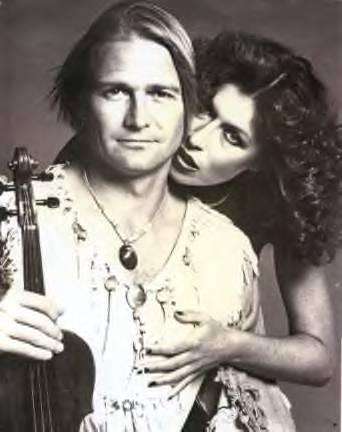 Linda, you come into the picture around this time, or was it earlier?
Linda, you come into the picture around this time, or was it earlier?
Linda: 1973. We met in ’73, started singing together in ’73, in Love Gun.
Did you have any singing experience before that?
Linda: I did some theatrical things in New York, and also from High School. I was actually a dancer when I met David, studying dance. He heard me singing to Stevie Wonder one time, and he said, “I didn’t know you could sing”, and he said, “I think you should sing in my band.”
David: I had another girl singing with me. Well, I gradually moved Linda in, and I trained her. She didn’t have any vocal training; I had training, so I shared what knowledge and training I had, up to a point, and then I got her studying with a famous vocal coach named Judy Davis. Judy Davis coached Tony Bennett, Johnny Mathis, Frank Sinatra, all of them. Maybe one of the most successful vocal coaches of all time for popular singers. Well, she worked with Linda for about a year or so, which gave her a lot more confidence and training. Eventually she found her voice and started being able to work in music. It takes a while to find it.
Linda: It was really hard in the beginning, because everybody wanted me to sound like Pattie [Santos], and I could imitate people, but I just decided I didn’t want to do that anymore. In fact David and I quit making music together for a year, and he just went off with the guys and played. And that’s when I got approached by Paul Kantner, who wanted me to take Grace’s place in the Airplane, but I had enough problems trying to replace Pattie. (David laughs)
David: And then I remember Sam Andrew [Big Brother and the Holding Company] called and wanted to know if you could do Janis’ songs.
Linda: Two years ago, he wanted me to do Janis with him in Big Brother.
David: He called up and said, “Is there any way we could get you to come out and do some of Janis’ songs?”
Those are some tough shoes to fill.
David: Yeah, who would want to step into those shoes, my god! (laughs all around)
Linda: I mean, I can imitate her for like one song, but to do it all night, that is never going to happen.
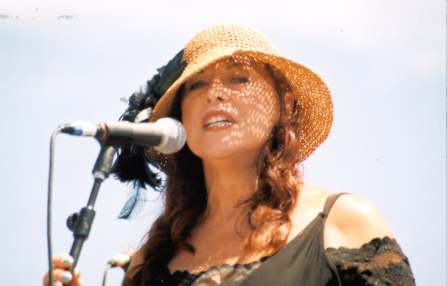 How did you and David meet?
How did you and David meet?
David: Actually I was playing with my Edge City band in North Beach — a really nice club, called the Orphanage. I played the gig down there, two nights, Friday and Saturday night. Friday night — let me see if I remember this right... Friday night Linda came in with her girlfriend.
Linda: We were actually a few doors up at the Keystone, the Wailers were playing. She loved violin. I said, “I don’t like violin, and I can’t stand that song 'White Bird,' I hate that song.” But she talked me into going down to the Orphanage to see David. (laughs)
...And how many times have you had to sing “White Bird” now?
David: I tell her that this is a good lesson in what hate will get you! (laughs) You’ll spend your whole life singing it now! Well, I saw her that night and I thought she was just the most gorgeous thing I ever saw in my life. And I was being interviewed, just like right now, and she and her girlfriend were sitting here [next table], and of course I spoke loud enough so they could hear every word I said. I was trying to impress her. I was playing the big shot role, but the whole time I don’t even care about the interview, I’m just thinking about her.
Linda: Well, the first night I went up and told him how much I enjoyed it, I really loved what he did on the violin and the singing, everything was just incredible, I’d never heard the violin played like that. So when I told him that, he said “You’re coming tomorrow night, aren’t you?”
David: She came back the second night, and then we went up to Enrico’s after the show and we got one strawberry ice cream soda and two straws, and we just sat there and looked at each other through the straws, and we’ve been together every minute ever since. (laughs) I don’t know, but for some reason there was something about her that made me feel absolutely complete, relaxed, and gave me the self-confidence that I had lost.
Has it been difficult working together?
David: Very tough. And we still have our moments, but it never goes deeper than that. Like the other night we were doing a performance, and she’s going around telling the guitar player to do this, and the drummer to do that, and then she comes over and starts telling me what to do... (laughs) I looked at her and said, “Hey, wait a minute, I’m the band leader, you are not the band leader, now go over there.&
Filed under: Reissues, Interviews, Issue 28
Related artist(s): Bobby Beausoleil, It's a Beautiful Day, David LaFlamme
What's new
These are the most recent changes made to artists, releases, and articles.
- Review: Sterbus - Black and Gold
Published 2026-03-03 - Release: Janel Leppin's Ensemble Volcanic Ash - Pluto in Aquarius
Updated 2026-03-02 15:06:51 - Release: Janel Leppin - Slowly Melting
Updated 2026-03-02 15:05:27 - Release: Alister Spence - Always Ever
Updated 2026-03-02 15:04:11 - Release: Let Spin - I Am Alien
Updated 2026-03-02 15:02:41 - Review: Falter Bramnk - Vinyland Odyssee
Published 2026-03-02 - Review: Exit - Dove Va la Tua Strada?
Published 2026-03-01 - Review: Steve Tibbetts - Close
Published 2026-02-28 - Release: We Stood Like Kings - Pinocchio
Updated 2026-02-27 19:24:02 - Release: Stephen Grew - Pianoply
Updated 2026-02-27 19:20:11 - Release: Thierry Zaboitzeff - Artefacts
Updated 2026-02-27 00:16:46 - Review: Kevin Kastning - Codex I & Codex II
Published 2026-02-27 - Release: Zan Zone - The Rock Is Still Rollin'
Updated 2026-02-26 23:26:09 - Release: The Leemoo Gang - A Family Business
Updated 2026-02-26 23:07:29 - Release: Ciolkowska - Bomba Nastoyashchego
Updated 2026-02-26 13:08:55 - Review: Immensity Crumb - Chamber Music for Sleeping Giants
Published 2026-02-26 - Release: The Gatekeepers - Diary of a Teenage Prophet
Updated 2026-02-25 15:55:58 - Listen and discover: Mordecai Smyth will not break your back
Published 2026-02-25 - Review: Mars Lasar - Grand Canyon
Published 2026-02-25
